- Home
- André Aciman
Eight White Nights Page 12
Eight White Nights Read online
Page 12
And if I did?
Let me focus here—as she tends to my wound.
Then, when she’s done being my nurse: So why did you do it? she asks.
Because of everything I wanted and never had.
Because of everything you wanted and never had. You’ll catch your death of cold sitting here.
So? To sit out this cold night and in the morning be found frozen blue, think I’d mind if it’s for you?
For me or for you?
I shrugged my shoulders. I didn’t know the answer. Both answers were right.
Amphibalence, she says.
Amphibalence, I say.
And it hits me that more was being said in this short conversation between our shadow selves in this lonely park than anything we’d spoken all night. A lovers’ colloquy, as in Verlaine’s poem, where both our shadows touch, the rest just waits, and waits, and waits. This wasn’t new. I’d been doing this for years.
•
“Something wrong?” It was a uniformed policeman who had just shut the door of his car and was crossing the park toward me. He looked like the only other being left on this planet.
I shook my head and pretended to look elsewhere. Had I been speaking to myself all this time?
“Are you all right?”
“Yes, Officer. I was just trying to collect my thoughts.”
Collect my thoughts—people get arrested for speaking like this.
“Not thinking of doing anything stupid, are you?”
Again I shook my head, smiling. Second time tonight.
“Been drinking?”
“Too much. Way too much.”
“Merry Christmas.”
“And to you too, Officer—?”
“Rahoon.”
“Rahoon, as in ‘She weeps over Rahoon’?”
“Don’t know that song.”
“Not a song—poem. Irish.”
“You don’t say!”
I was about to say youbetya but figured, better not.
“So what you got, woman trouble?” He crossed his arms. I could see the edges of his bulletproof vest bulge under his tight blue jacket.
“Nope. Not woman trouble. It’s just the old man’s gone. Was just thinking about him tonight, soon it will be exactly a year ago.” And suddenly I remembered his very own words, Soon I won’t even know I ever lived—and if my shadow bumps into yours on a busy sidewalk, my heart won’t jump as it did that night when you peeked into my room. So much love and all of it a waste, so many books and verses stored, and all of it gone. I look at this hand, and I know, soon I’ll no longer see it, for it’s no longer quite mine, the way my eyes are not quite mine, I’m not even here, my feet have already gone before me and found a cozier spot at God knows what time zone beyond Lethe and Phlegethon. I won’t even remember Lethe or Phlegethon, or the mutinous Shannon waves, or Phaedo, or brave Aristides and those long speeches by Thucydides we read together. All these immortal words, gone; Byzantium, gone. Pff! Part of me is no longer mine, the way life was never really mine, the way my clothes and my shoes and the smell on my body were never really mine, the way even “mine” isn’t mine any longer, my thoughts, my hair, my everything have drifted from me, and love too is no longer mine, just borrowed, like an umbrella from a tattered old coatrack—you and me, umbrellas on a coatrack, though you’re closer to me now than the blood in my neck, the breath of my life. I look at myself in the mirror and all I’m doing is saying goodbye to both my face and yours. I’m leaving you piecemeal, my love, and I don’t want you to grieve, I want to take this picture of you now to wherever they’re forcing me to go now and hope that once I’ve shut my eyes this will be the last thing to go, for the last thing you see they say is the one you take forever, if “take” means anything beyond Lethe and Phlegethon.
“Do you know Lethe and Phlegethon, Officer?”
“Who’re they?”
“No matter.” The worst part of dying is knowing you’ll forget you ever lived and ever loved. You live seventy or so years, and you die forever. Why can’t it be the other way? To be dead for seventy years—and throw in another seventy for good measure—but to live forever. What purpose does dying serve, anyway? I don’t care who says no human could endure living more than a lifetime. Ask the dead and see what answer you get—ask the dead what they wouldn’t give to be here and catch tonight’s snow, or have a week of starlit nights like these, or fall for the world’s most beautiful woman. Ask the dead.
“ ‘Just promise me this,’ he would say, ‘that when the time comes, you’ll help me—but only if I ask, not before, and so long as I can hold out, but not sooner.’ ”
“And did he ask?”
Was the lawman being cunning with me?
“He never asked.”
“They never do when the time comes. So what you so broken up for?”
“He went to sleep for a few hours and I walked about the neighborhood like a lover waiting for a girlfriend to clear every last thing she owns from his home, hoping she’ll change her mind, until I passed by a park and I knew, by the hiss of the wind through the trees in the cold, that he’d arrived safely. I was to read Plutarch to him. I let it happen.”
“Intentionally?”
“I’ll never know.”
Tell me I’m not cruel, Officer Rahoon. Tell me that he knew, Officer Rahoon.
“Just look at this moon.”
“Good night, moon,” I said.
“Good night, moon,” he repeated, to humor me, shaking his head, meaning, You people!
A beggar woman had crossed the street and was coming toward us. The park was probably her bedroom. Her bathroom. Her kitchen. Her parlor. “Mister, some bread.”
I put my hand in my pocket.
“Are you out of your mind!?” said the policeman. Then turning to the beggar, “Beat it, mamacita.”
“Don’t be cross with her. It’s Christmas.”
“She puts her grubby fingers on you—and see how Christmasy you feel.”
The beggar woman who had spotted a soft heart kept her gaze on me, begging silently.
Just when I was about to leave Straus Park, I took out a five-dollar bill and snuck it into the hand of the beggar woman. Por mi padre.
“Seriously?”
“Let it rest, Officer,” I said. You never know, I wanted to say. In another age, the old hag would have asked me to sit on one of these benches, brought a bucket to wash my feet, spotted something, and I’d be home. Y por Clara también. I should have added.
Rahoon and his car were gone, everything was quiet again.
As I crossed what must have been the street and not just the sidewalk, I looked back at the park, knowing now that I’d give anything to start the evening all over again exactly as it had turned out—do with time what Romans did when they gorged themselves on food—regurgitate time, wind the clock back to seven o’clock, and start right here in Straus Park again. It is snowing. I am still very early for the party. I’ll stop and have tea in this little coffeehouse. Then I’ll head to the building, pretend I am not sure that this is the correct address, shake my umbrella, watch the burly Russian with the stentorian voice open the door for me, and walk into the elevator, whose Gothic doorway doesn’t give a hint of where things are headed tonight. I wanted to start the evening all over again, and many more times again, because I did not want it to end, because, even if something wistful and unfinished hung over the entire night, I would take it, wistful and unfinished night that it was, and consider myself twice blessed.
Tomorrow night I would come and relight each candle all over again, one by one, and, looking around me, almost feel how every corner of the park still echoed with Clara’s presence, with me, my life, and how I live it, and with my father, who, unbeknownst to me, had been trailing me from the very start this evening and to whom I was holding on as to a shadow that is any moment about to dissolve but then comes back to take a last look, as if he’d forgotten his keys, then back again because he’d forgotten his glas
ses, and once again because he’d forgotten to check the gas, and would be coming back many more times again like the poor, restless, tormented man who’d known scant love in his life, as I would be coming back to this spot, fearing I’d left something behind, knowing that what we leave behind is a shadow self, but that this shadow self is the truest and most enduring of all our selves.
Looking back one last time, I thought to myself how much I’d always liked this little park, and how easy it would be to come back tomorrow and sit here awhile, and in the whiteness of the hour preceding sunup, contemplate once more, as ever again, the imperishable silence of the stars.
SECOND NIGHT
I spotted her right away. She was standing outside the movie theater. A crowd was gathered around the box office, and the line of ticket holders extended halfway down the block. From the island in the middle of Broadway, I dove across even before the light changed. When I looked at the crowd again, she was gone. I was almost certain it was Clara.
I had spent the whole day thinking of her, and already twice—at lunch, and later at Starbucks—could have sworn I’d seen her drift in and out of my field of vision, as though wishful thoughts had raced ahead of me and pasted her features on anyone bearing a resemblance. Now running into her a third time today would ruin the spontaneity and allow me to say things I’d had plenty of time to rehearse hours earlier—anything from the initial shock and bliss of bumping into her to the pretense that I was having a hard time placing her—Oh yes, last night, Hans’s party, of course—to a desperate, overzealous desire to restore that initial shock and resist all camouflage by blurting out something seemingly unstudied: I’ve been thinking of you all day, all day, Clara.
All day I’d been doing just that. Looking for one store that was open on Christmas Day and finding all of them closed, lunching with Olaf, who badmouthed his wife in one unending screed, in the packed greasy spoon because everything else was closed, trying to shop for Christmas presents on Christmas Day, the whole day punctuated by hazy premonitions that last night might happen all over again. I had spent the entire day totally spellbound by our parting in the snow, wearing, but not wearing, my coat, saying goodbye with a handshake after she’d walked me to the bus stop and rushed back to her building, handing the doorman the umbrella she had borrowed, not turning, but then turning back at the last moment, every last part of me clinging to the memory of her elbow resting on my shoulder at the party, her burgundy suede shoes kicking off the snow, the cigarette, the ex-boyfriend, the Bloody Mary she had scarcely touched and later abandoned on the balcony while I’d stared at her open blouse, wondering all night why in someone so tanned was the base of her breasts so fair. I’ve been thinking of you all day, all day.
Would I have the courage to say this?
I caught myself making a wish: I would tell her I’d been thinking of her all day provided she materialized on Broadway and Ninety-fifth tonight. Humbled, hopeful, happy, I’d tell her however it came out.
Or this: I was just thinking of you—with a waggish smile in my voice, almost as though I wasn’t sure I was telling the truth. She’d know how to read this.
For good measure, I already assumed a flustered, unfocused air allegedly caused by my bold dash across Broadway—which would also justify my failure to notice her any sooner.
I was hoping it would be you—but then I said it couldn’t be—yet here you are.
While I was trying out these phrases like someone matching neckties to a shirt, I made every effort not to look in the direction of the crowd. I didn’t want her to know that I had already spotted her and was simply pretending. I wanted to think she’d recognize me first and be the first to seek the other out.
But there was another reason for not looking in her direction. I didn’t want to dispel the illusion or undo the thrill of running into her. I wanted to hold on to that illusion and, like a well-behaved Orpheus determined to keep his end of the bargain, I wanted to think that she’d already seen me and was just now making her way toward me, provided I didn’t look back. I wanted to cup my hands around this tiny, furtive, shameful hope as if all I had to do then was look away, keep looking away, and so long as I kept up with the pretense, she’d come behind me, place both palms on my eyes, and say, Guess who? The more I resisted turning in her direction, the more I could feel her breath graze the back of my neck, closer and closer, the way she had let her lips almost touch my ears at the party each time she’d whisper to me. There was something so enthralling about waiting and hoping, without so much as giving a hint I knew I was being watched, that I even caught myself trying not to hope so much—she couldn’t possibly be there tonight, what was I thinking!—realizing all along that this sobering strain of counterhope was not just my way of seeing that life seldom grants us what it knows we want, but also my own twisted way of courting its goodwill by pretending to forget it likes nothing better than to grant us our wish once we’ve all but given up and embraced despair.
Hope and counterhope. First you think you’ve spotted her, then you can’t quite bring yourself to believe it, and in between both options you’re instantly rummaging for things to say, for an attitude to strike—hide the joy—show the joy—show you’re hiding the joy—show you’re showing every last strain of joy. Then you spot someone who simply looks like her. The illusion is shattered. It’s someone else.
But then, because the things you thought you’d say thrilled you and seemed to blanket the cold evening around you, you suddenly catch yourself wanting to undo the thrill yourself rather than have others do it for you. Perhaps, you begin to think, it’s just as well this way; such encounters never happen, it’s pointless to think they might, and besides, the quiet evening at the movies you’d been looking forward to all day was finally being given to you, and just as you’d planned. You and the movies are going to sit and spend hours together, though, because of a face half perceived in the crowd, perhaps something might indeed happen between you and the film, as though the film could in its own strange way bring to life the very things you’ve been asking by granting them on-screen instead.
Later, after seeing the film, I’d probably find the lingering mirage of her presence around the box-office window. The mirage had already begun to cast its radiance around the whole evening, and I knew that if the illusion of having seen her was something I could take with me to the movies and snuggle up with for a few hours, the movie in return would allow me, once I stepped out onto the sidewalk, to take home with me the sense that the thing that happens between men and women in films had indeed happened to me tonight.
Perhaps this last illusion was nothing more than a desperate attempt to buoy my spirits before giving up on the day and locking myself in the theater for five hours. By midnight, I thought, it would be tomorrow already—and this strange Christmas Day that had started in a fairy-tale greenhouse and couldn’t have felt more aimless afterward was finally being let go of, like an unmoored punt starting to drift with the rising tide of the day-to-day.
After the movies, I’d take a bus, or walk home, or take a cab farther downtown, or stop somewhere along the way, if for no other reason than to see faces before calling it a night.
To see faces as opposed to not seeing any at all. Faces. People. Midnight people, otherpeoples who’ll brave a storm to buy cigarettes, walk a dog, grab a bite, get the paper, or, like me, see faces.
I began to think of places I’d wander to after seeing the film. A barand-grill. Or Thai Soup.
I had good memories of Thai Soup.
Trench soup she’d have called it, with beef pandangst. How I missed her way of taking something, then turning it upon itself, and then turning it back to how it was before, knowing it would never be the same afterward.
Then I saw her.
I wanted to sound surprised—but not totally thrown off—as if I’d expected something of the sort but had let the matter slip and never given it another thought.
Perhaps I would find a way to tweak the conditions of my initial
wish now that it had been granted and no longer feel bound to tell her how I’d been thinking of her all day, all day.
“Clara?” I asked, exaggerating my surprise, as people do when they rush to greet you first, for fear of being caught trying to avoid you.
“There you are. Finally!” she shouted. “I tried calling you a million times, but you’re never ever home”—it almost sounded like a lover’s reproach—“I thought you had changed your mind and weren’t going to come.”
To show she wasn’t exaggerating, she displayed two tickets clasped tightly in between flushed knuckles. “I’ve been waiting and waiting and waiting. And. It. Is. Freezing,” she said, as if all this was my fault. “Here, feel.” She brought her palm to my cheek to prove how cold. “I’ve called you so many times I know your number by heart. Here—” She turned her cell phone toward me and began to scroll down row after row after row of countless friends. It took a few moments to recognize the numerals on the colored screen. Under the phone number I saw something else that looked uncannily familiar: my name—last name first, first name last. Was I officially on her A-list? “Why don’t you answer your télyfön?” I didn’t know why I didn’t answer my télyfön.
In her place I would never have entered someone’s name that way. Putting a totally new name on my permanent list would have nipped every hint of uncertainty, chilled the flustered hesitation with which we palpate a stranger’s name before admitting it into the ledger of our lives; I would have placed it in abeyance, in limbo—until it had “proven” itself. The inadvertent misspelling on a paper napkin, the name hastily plunked down in the cold, the intentional absence of a surname to show we’re not so sure we’ll call—all these are not just markers of inner diffidence and hesitation along the twisted path to others, they are also loopholes in every exaltation, the shallow wetlands we leave behind for speedy backtracking. I would never have listed her under Brunschvicg. Nor would I have entered her name or her number in my cell phone’s memory. I’d have made every effort to unremember her number if I caught myself already knowing it by heart.

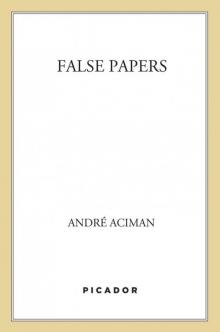 False Papers
False Papers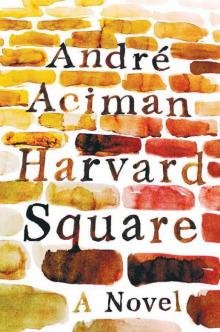 Harvard Square
Harvard Square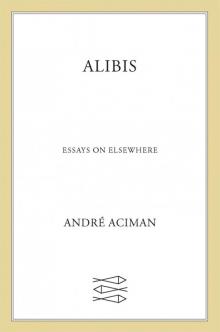 Alibis
Alibis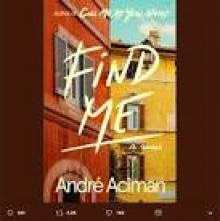 Find Me
Find Me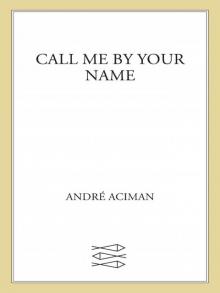 Call Me by Your Name
Call Me by Your Name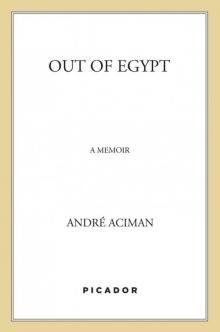 Out of Egypt: A Memoir
Out of Egypt: A Memoir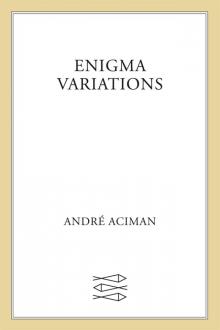 Enigma Variations
Enigma Variations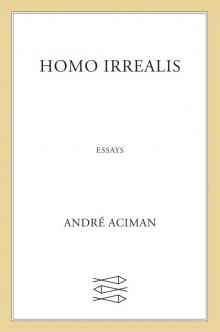 Homo Irrealis
Homo Irrealis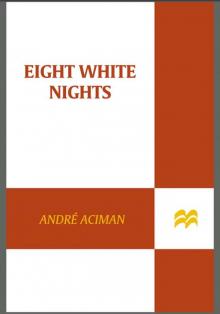 Eight White Nights
Eight White Nights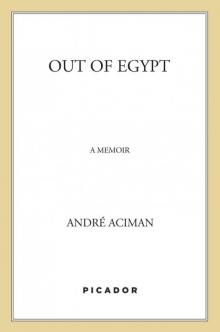 Out of Egypt
Out of Egypt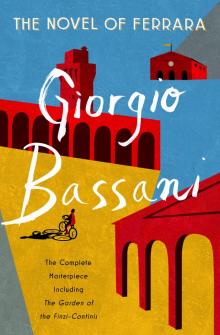 The Novel of Ferrara
The Novel of Ferrara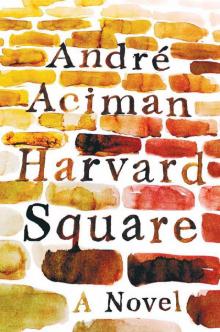 Harvard Square: A Novel
Harvard Square: A Novel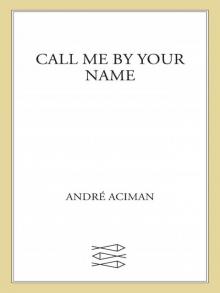 Call Me by Your Name: A Novel
Call Me by Your Name: A Novel